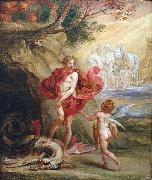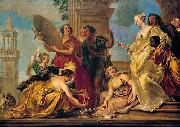Jan Boeckhorst El petróleo que Pinta la ReproducciónAll Jan Boeckhorst Oil PaintingsBorn in Westphalia, in either Menster or Rees, Boeckhorst moved to Antwerp around 1626. He had a close relationship with Rubens's studio, finishing paintings designed by that master as well as assisting with large series such as the joyous entry of Cardinal-Infante Ferdinand in 1635 and the Torre de la Parada. He also collaborated as a figure painter in landscapes and still lifes by Jan Wildens and Frans Snyders, and sometimes painted lively group portraits.[1] He traveled to Italy in the years 1635-1639 and joined the Bentvueghels with the nickname Lange Jan (Tall John). Cornelis de Bie, in his Gulden Cabinet der Edel Vry Schilderconst (The Golden Cabinet of the Honourable Free Art of Painting; 1662), remarks that Boeckhorst was a student of Jordaens. Works in that master's style include large genre paintings of the 1640s such as Peasants going to Market (Antwerp, Rubenshuis), which also acts as an allegory of the four elements. In the 1650s and 1660s Boeckhorst painted altarpieces for churches throughout Flanders and designed cartoons for tapestries. |
|||

|
|||
|
|
|||
|
||||||||
| Jan Boeckhorst Born in Westphalia, in either Menster or Rees, Boeckhorst moved to Antwerp around 1626. He had a close relationship with Rubens's studio, finishing paintings designed by that master as well as assisting with large series such as the joyous entry of Cardinal-Infante Ferdinand in 1635 and the Torre de la Parada. He also collaborated as a figure painter in landscapes and still lifes by Jan Wildens and Frans Snyders, and sometimes painted lively group portraits.[1] He traveled to Italy in the years 1635-1639 and joined the Bentvueghels with the nickname Lange Jan (Tall John). Cornelis de Bie, in his Gulden Cabinet der Edel Vry Schilderconst (The Golden Cabinet of the Honourable Free Art of Painting; 1662), remarks that Boeckhorst was a student of Jordaens. Works in that master's style include large genre paintings of the 1640s such as Peasants going to Market (Antwerp, Rubenshuis), which also acts as an allegory of the four elements. In the 1650s and 1660s Boeckhorst painted altarpieces for churches throughout Flanders and designed cartoons for tapestries. |
||||||||
|
|
||||||||
| Pintura identificación:: 86576 Apollo and the Python 17th century Medium Oil on canvas Dimensions 59.9 x 51.2 cm (23.6 x 20.2 in) cyf |
||||||||
|
|
||||||||
| Pintura identificación:: 98057 Achilles among the daughters of Lycomedes after 1650(1650) Medium oil on canvas Dimensions 129.5 x 179.5 cm cyf |
||||||||
|
|
||||||||
|
| ARTISTA PREVIO PROXIMO ARTISTA | |||||||
|
|
||||||||
|
Jan Boeckhorst Born in Westphalia, in either Menster or Rees, Boeckhorst moved to Antwerp around 1626. He had a close relationship with Rubens's studio, finishing paintings designed by that master as well as assisting with large series such as the joyous entry of Cardinal-Infante Ferdinand in 1635 and the Torre de la Parada. He also collaborated as a figure painter in landscapes and still lifes by Jan Wildens and Frans Snyders, and sometimes painted lively group portraits.[1] He traveled to Italy in the years 1635-1639 and joined the Bentvueghels with the nickname Lange Jan (Tall John). Cornelis de Bie, in his Gulden Cabinet der Edel Vry Schilderconst (The Golden Cabinet of the Honourable Free Art of Painting; 1662), remarks that Boeckhorst was a student of Jordaens. Works in that master's style include large genre paintings of the 1640s such as Peasants going to Market (Antwerp, Rubenshuis), which also acts as an allegory of the four elements. In the 1650s and 1660s Boeckhorst painted altarpieces for churches throughout Flanders and designed cartoons for tapestries. |
||||||||
|
|
||||||||
|
CONTACTE EEUU |







